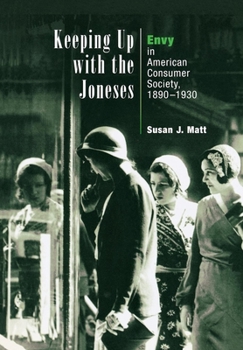Keeping Up With the Joneses: Envy in American Consumer Society, 1890-1930
Select Format
Select Condition 
Book Overview
A century ago many Americans condemned envy as a destructive emotion and a sin. Today few Americans expect criticism when they express envy, and some commentators maintain that the emotion drives the economy. This shift in attitude is Susan Matt's central concern. Keeping up with the Joneses: Envy in American Consumer Society, 1890-1930 examines a key transition in the meaning of envy for the American middle class. Although people certainly have experienced envy throughout history, the expansion of the consumer economy at the turn of the twentieth century dramatically reshaped the social role of the emotion. Matt looks at how different groups within the middle class--men in white-collar jobs, bourgeois women, farm families, and children--responded to the transformation in social and cultural life.
Keeping Up with the Joneses traces how attitudes about envy changed as department stores, mail-order catalogs, magazines, movies, and advertising became more prevalent, and the mass production of imitation luxury goods offered middle- and working-class individuals the opportunity to emulate upper-class life. Between 1890 and 1910 moralists sought to tame envy and emulation in order to uphold a moral economy and preserve social order. They criticized the liberal-capitalist preoccupation with personal striving and advancement and praised the virtue of contentment. They admonished the bourgeoisie to be satisfied with their circumstances and cease yearning for their neighbors' possessions. After 1910 more secular commentators gained ground, repudiating the doctrine of contentment and rejecting the notion that there were divinely ordained limits on what each class should possess. They encouraged everyone to pursue the objects of desire. Envy was no longer a sin, but a valuable economic stimulant. The expansion of consumer economy fostered such institutions as department stores and advertising firms, but it also depended on a transformation in attitudes and emotional codes. Matt explores the ways gender, geography, and age shaped this transformation. Bridging the history of emotions and the history of consumerism, she uncovers the connection between changing social norms and the growth of the consumer economy.




